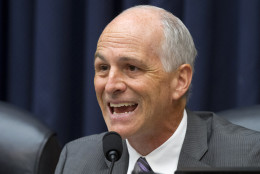Adam Smith
-
The Defense Department is looking to conduct another round of Base Realignment and Closure in 2021, but as usual, lawmakers are jumpy about losing military bases in their districts.
June 08, 2017 -
Industry and lawmakers generally like the bill, but think it might need to be fleshed out a little more.
May 19, 2017 -
Top officials in two military branches say a yearlong continuing resolution would stop civilian hiring and flying hours.
March 22, 2017 -
DoD's $52 billion budget boost is not carte blanche; it's going to have to prove that it’s spending that money wisely, not frittering it away on superficialities.
March 21, 2017 -
2017 may finally offer a peek of sunlight for another base realignment and closure cycle. Congressional resistance to BRAC is faltering, said Chris Preble, vice president for defense and foreign policy studies at the Cato Institute, and that may bring some fiscal savings to DoD.
February 27, 2017 -
The House Armed Services Committee’s top Democrat said Thursday that he plans to reintroduce legislation that would allow the Defense Department to conduct a new round of base realignments and closures (BRAC).
January 27, 2017 -
Just hours after the conclusion of James Mattis' confirmation hearing to be the next secretary of Defense, a broad bipartisan majority of 81 senators voted Thursday to make an exception from the seven-year cooling off period for military officers and allow him to become the department's top civilian leader.
January 13, 2017 -
The expected nomination of retired Marine Gen. James Mattis to become secretary of defense depends on a one-time change to federal statutes that require military officers to have been retired for at least seven years before becoming the civilian leader of the Pentagon.
December 05, 2016 -
Transgender service members may now serve openly and will be able to receive medical care relating to transgender issues.
June 30, 2016 -
Defense Secretary Ash Carter called the House proposal "deeply troubling," saying it would pay for additional troops and pay boosts at the expense of long-term military readiness and budget stability.
April 28, 2016 -
DoD says its “conservative” estimates show that it is paying to maintain 22 percent more military base infrastructure than it can put to practical use.
April 18, 2016 -
The Office of Management and Budget, the Homeland Security Department and the Office of Personnel Management decided not to testify during a classified briefing before the House Armed Services Committee when they found out the meeting would be on the record and transcribed.
November 17, 2015 -
Defense Secretary Ashton Carter said Wednesday that he has advised President Barack Obama to veto the Defense Authorization bill Congress will vote on later this week for several reasons.
October 01, 2015 -
House and Senate negotiators finally shook hands Tuesday on a defense authorization bill both parties generally support and would enact some of the most sweeping and aggressive changes to the military’s personnel and acquisition systems in several decades.
September 30, 2015 -
The House passed its version of the annual defense authorization bill Thursday, while the Senate's is still a work in progress. Both versions mostly shun DoD's proposals to cut costs during sequestration.
May 23, 2014















